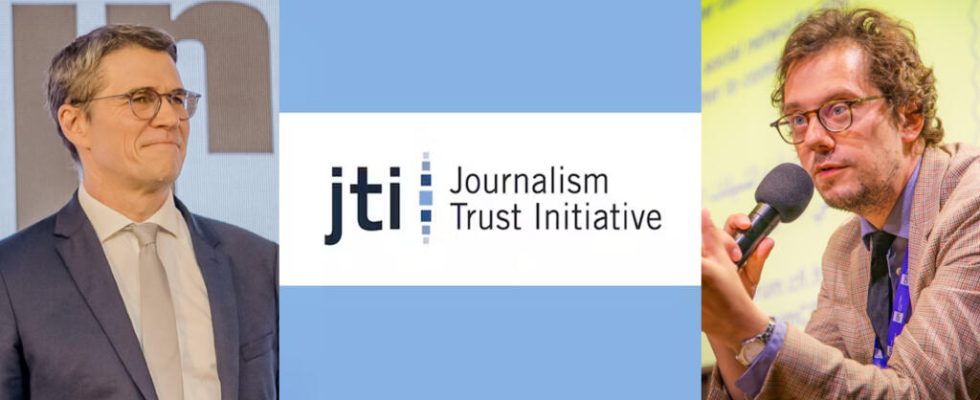The Journalism Trust Initiative (JTI) is a certification tool initiated by Reporters Without Borders (RSF) to assess transparency and compliance with standards of ethics and professional conduct of news media. France Médias Monde, parent company of RFI, France 24 and MCD, recently obtained this certification. To talk about it, The media workshop receives Thibaut Bruttin from RSF, and Jean-Marc Four, director of RFI.
The distrust of some citizens towards the media is well established. But in the world of information, some are working to find solutions to create favorable conditions for the return of trust.
Among these proposed solutions, there is the Journalism Trust Initiative (JTI), which in French could be described as an initiative for the reliability of information and good journalistic practices, designed in 2019 by Reporters Without Borders (RSF). The JTI is a certification tool for news media that wish to be transparent about their organization and editorial practices, particularly in terms of ethics and professional conduct.
The parent company of RFI and France 24, France Médias Monde, recently obtained this certificationafter answering 130 precise questions whose answers were verified by an independent certification body.
Thibaut Brutindeputy to the director general of RSF where he is in charge of the JTI, and Jean-Marc Fourdirector of RFI since May 2023, came to The media workshop for more than half an hour to present the JTI, discuss its news and its ambitions.
Selected extracts:
Thibaut Bruttin : “ We said to ourselves […] that it was important […] to find an initiative that makes it possible to promote best practices in journalism, which also promotes transparency with regard to the different actors in the media system, whether advertisers, platforms or the general public. And that’s why we made a choice […] which is that of standardization, which exists in most industrial sectors, but which did not exist in the field of journalism. »
Jean-Marc Four : “ I think that France Media Monde was really right to take this step and to request this certification. […] We are in a world full of mistrust where false information is multiplying […] so everything that can help us fight against this distrust, everything that can help us demonstrate that we are rigorous, that we are independent, all that is little, but it is already a lot to fight in this universe of distrust and in this case this certification, it is, it is nevertheless extremely complete. There are a lot of criteria which are very strict, very varied, which end up forming a fairly complete global landscape of what a media and its independence can be today. Of course, in our profession, objectivity does not exist. However, anything that can make it possible to objectify this independence and this rigor of a media, I think is useful in the landscape that I described just before. So yes, this approach had to be taken, I fully approve of it. »
Thibaut Bruttin : “ It’s a positive approach. This involves inviting the media to engage in a process of transparency. We are not judging the media, there is no control of their editorial line, there is no a priori definition of what the content of the media should be. It’s really a procedural norm so that’s really fundamental for us because there is a temptation which is entirely legitimate and sometimes very effective, which is that of entering into blacklisting, of entering into naming and shaming. We are more into praising, its exact opposite, and I believe that is what makes the difference and which means that we also have the interest of many media because they see the advantage that There is. To somehow anticipate the expectations of the public, the expectations also of advertisers or also of platforms since it is something which answers a fundamental question which is: what is a media which practices a journalist of quality ? »
Jean-Marc Four : “ I think that these certification processes are indeed a way of affirming that there are objective criteria for journalistic work, the independence of information and sending this message to States and governments – including in democracies – this is absolutely major. Because […] even in democracies, we clearly see that there are recurrent, unfortunately frequent, temptations to limit freedom of the press. […] Affirming these criteria of independence and rigor via the JTI is also a way of sending messages to the public authorities saying, protect us, be aware that it is important that we are protected. »
Subscribe to the “L’Atelier des Médias” podcast
The Media Workshop is available to listen to every Saturday on all podcast platforms: Apple Podcasts, Spotify, Deezer, Addict Podcast, Castbox, Google Podcasts, You do not In or any other application using the RSS feed.
If you like this show, give it 5 stars and post a comment on podcast listening apps to make it visible and therefore even more listened to.
Mondoblog audio says the blogger Leaticia Marie Eliane Nabifrom Burkina Faso.
